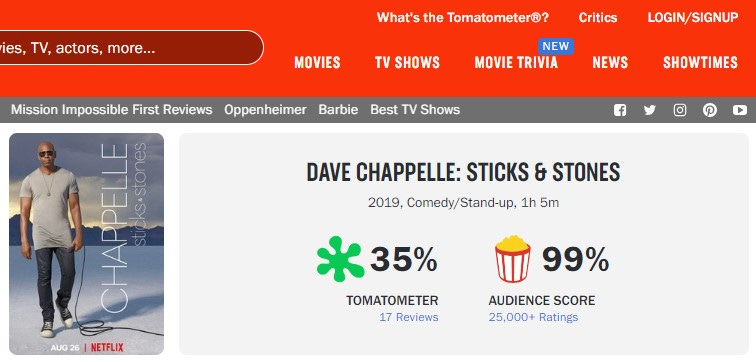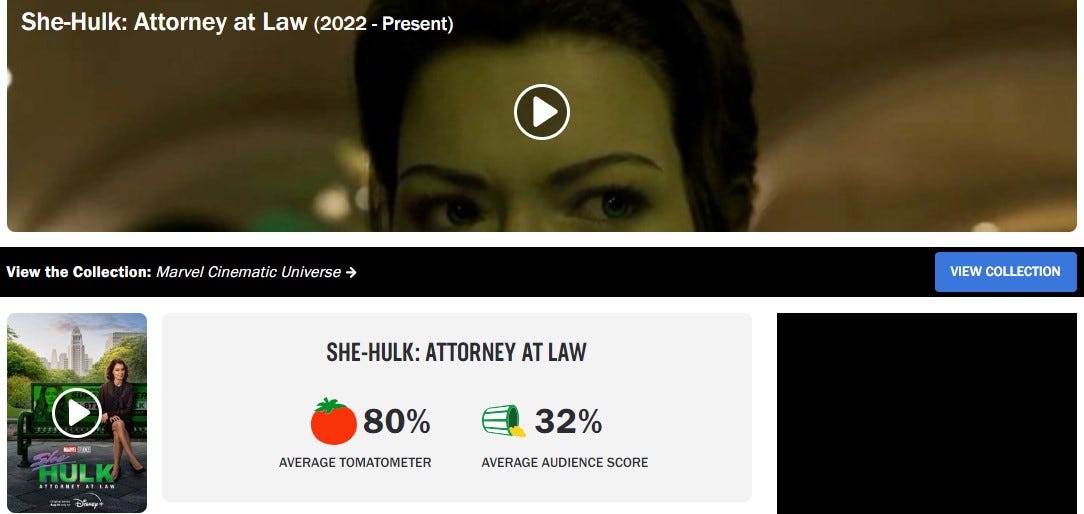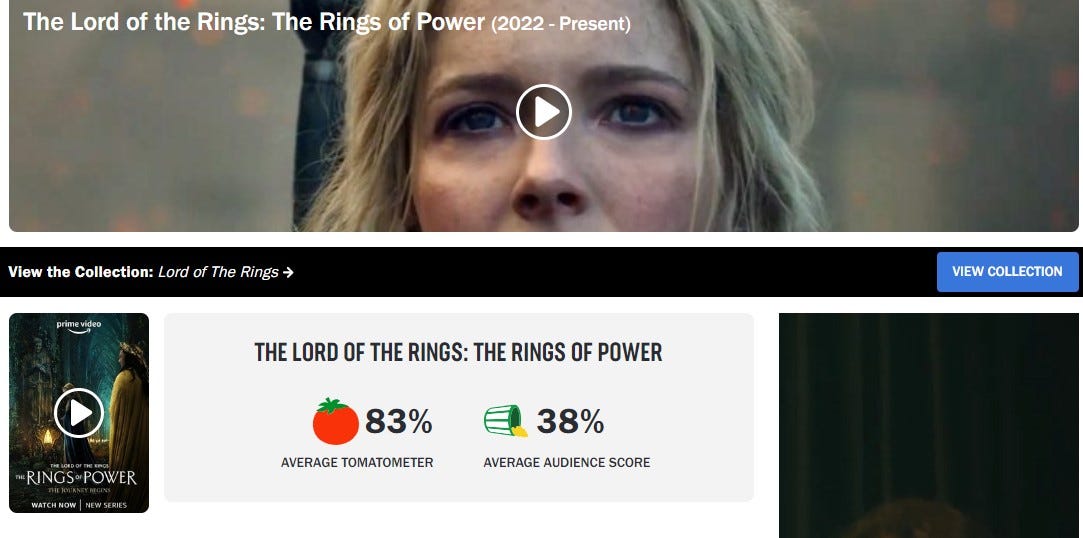Rotten Tomatoes: Reflecting Division...
How Film Reviews Shine a Light on Cultural Indoctrination
To begin, many people will criticize my labelling of the modern progressive worldview as ‘indoctrination’ and that’s fair, since the term is only slightly less loaded than ‘brainwashing’. However if we use a more value-neutral understanding of ‘doctrine’ as written and applied truths which are transmitted and believed without question, we will see that all cultures have their own ‘doctrines’ of family arrangement and cultural value and gender role. We could say that boys and girls in the United States circa 1900 were indoctrinated to believe that men and women had different natures and family authority and roles, that polyamory and promiscuity were sinful, that alcoholism was a sign of weak character and that homosexuality was a perversion and a mark in the eyes of God, among many dozens more.
We could say with equal accuracy that adolescents and undergraduates in our culture are taught that US history is full of evil and oppression, that the differences between men and women are socially constructed, that everyone has an innate ‘gender identity’ which might be mutable or flexible but which can never be presumed from or correlated with their physical characteristics, and the values and religious beliefs of the earlier American mainstream (the 1950’s, say) are deserving of especial derision. If 1950’s America taught that fathers have authority over their wives, this is a belief worthy of ridicule. If contemporary Egyptian society teaches that fathers have authority over their wives, this is a different cultural practice and deserving of a kind of reverence.
Much of what I write is in the service of trying to get people to understand the beliefs with which they’ve been indoctrinated and to accept that the worldview of the modern American teenager is no more based in science or reason than that of the year 1900 American. In fact-because those modern values are so new and are heavily based upon some very short-term political goals, while the older ones were mostly developed over hundreds of years of scarcity and struggle, when unworkable ideas and values were eliminated-I think the values of the year 1900 American are often scientifically more true and more beneficial, in a general anthropological sense, than the ones we have today.
I’ll call the worldview of the modern young ‘Critical Theory’ because that is the well from which most of these tendencies and memes were ultimately drawn. I’m not saying that the average American teenager is a Critical Theorist; they have no idea what that means. The celebration of seeing arrogant, masculine, dominant female superheroes (Captain Marvel) or the aversion to having a heroine seek to capture the love of a male character (the modern versions of The Little Mermaid, Peter Pan, Snow White) are all values that were created by Critical Theory as tools to change the culture of the time. Critical Theory germinated and spread through the colleges and in the past 10-20 years the colleges have become more dominated by those ideas and those ideas have become more totalitarian, so that speakers who dissent from their ideas (even slightly or on a single point) are labelled ‘harmful’ by administrators and often assaulted or threatened or drowned out by protestors.
Due to all of this there now exists a massive divide in the US, between the people who attended those colleges and those who have not (or did before year 2000, say). That’s why we now have the most coddled and privileged and wealthy Americans professing an ideology which is all about radical change and levelling privilege. I have already written about the soft hypocrisy of the most privileged people in our country exhorting everyone to be aware of and surrender privilege while they work to hoard their own. I think that the fact that the BLM-adjacent worldview is far more popular among white undergraduates at Yale than it is among young black men in America will create more ridiculous movements and values, until it probably collapses under its own contradictions. The division persists, though, because of the distinct class divisions in the US. Most progressives are wealthier than average, and the wealthiest ones (who tend to be the most progressive) are also the most completely isolated from working class people. These people don’t even understand how patronizing and out-of-touch they are… how could they?
One place we can see the results of this stark division is on Rotten Tomatoes. The disparate scores below were pulled by me, in two minutes, off the top of my head, and they are all due to the radically different political and cultural values of the respective groups of reviewers:
These aren’t aberrations or random fluctuations. They were predictable and predicted (by me and many others) before the programs were even reviewed.
They are a sign of division and of mutual incomprehension. Like the truly indoctrinated the modern creatures of the Critical Theory worldview don’t even see their worldview as a set of political formulations; they truly believe that what they believe is just what decent people believe and that anyone who believes differently must be an ‘ist’ or a ‘phobe’ of some kind. Their cognitive dissonance upon learning that most black Americans, for instance, find their worldview bizarre and ridiculous is truly a delight to behold.
If you doubt the incomprehension at work here, consider this: I googled ‘Rotten Tomatoes Disparity’ to see if I could find some more extreme examples than these (for there are MANY). I got a list of 13 shows and films that the reviewers tended to like more than audiences (or vice versa) for differences of narration or production. The average difference in review averages were less than these. None of these productions was included in the list. Even a young person writing an article about Rotten Tomatoes review disparities can’t or won’t see the sharp ideological divide at work.
Eventually, such worldviews always collapse. They simply lack sufficient contact with reality. The only question is how much damage they do before they go.








This first truth is frankly banal; but it is so perpetually ignored in our political prosing that it must be made plain. A little boy in a little house, son of a little tradesman, is taught to eat his breakfast, to take his medicine, to love his country, to say his prayers, and to wear his Sunday clothes. Obviously Fagin, if he found such a boy, would teach him to drink gin, to lie, to betray his country, to blaspheme and to wear false whiskers. But so also Mr. Salt the vegetarian would abolish the boy’s breakfast; Mrs. Eddy would throw away his medicine; Count Tolstoi would rebuke him for loving his country; Mr. Blatchford would stop his prayers, and Mr. Edward Carpenter would theoretically denounce Sunday clothes, and perhaps all clothes. I do not defend any of these advanced views, not even Fagin’s. But I do ask what, between the lot of them, has become of the abstract entity called education. It is not (as commonly supposed) that the tradesman teaches education plus Christianity; Mr. Salt, education plus vegetarianism; Fagin, education plus crime. The truth is, that there is nothing in common at all between these teachers, except that they teach. In short, the only thing they share is the one thing they profess to dislike: the general idea of authority. It is quaint that people talk of separating dogma from education. Dogma is actually the only thing that cannot be separated from education. It is education. A teacher who is not dogmatic is simply a teacher who is not teaching.
GK Chesterton